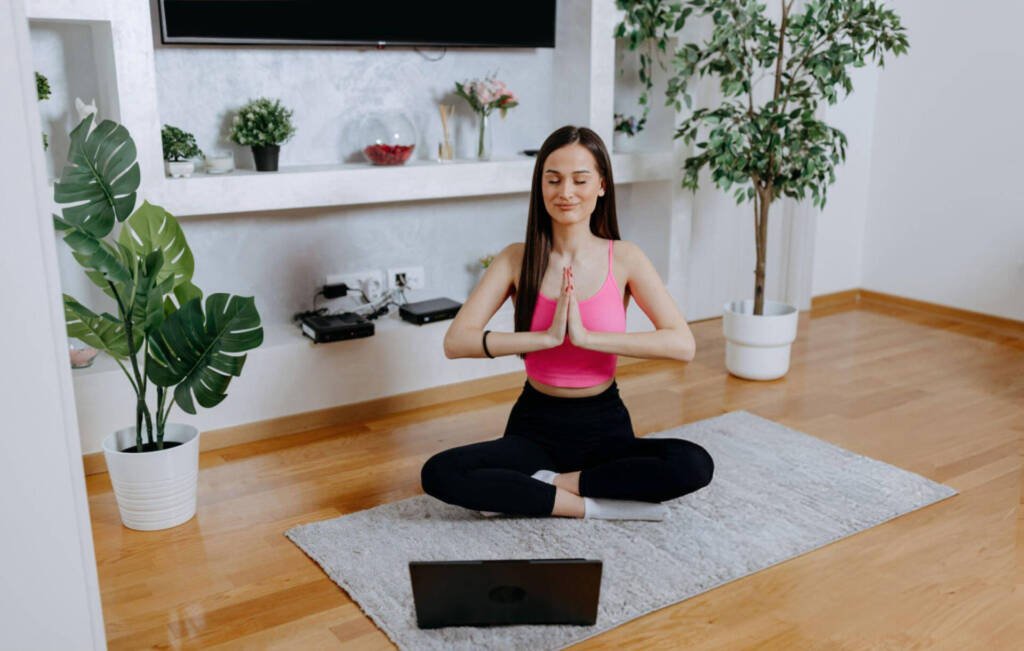Ever wake up with your mind already racing before you’ve even had your coffee?
You’re not alone. For many of us, mornings can feel like a whirlwind before the day has even started. That overwhelming, uneasy feeling—commonly known as morning anxiety—can hit hard. Whether it’s the endless to-do list staring at you or your brain kicking off the day with a flood of worries, mornings don’t always feel like the “fresh start” we’re told they should be.
But what if mornings didn’t have to feel this way? What if they could be calmer, more intentional, even uplifting?
In this post, we’ll explore why morning anxiety happens, how it affects your mood and mental health, and—most importantly—how a simple, calming morning routine can make all the difference. Imagine starting your day feeling grounded and in control instead of stressed and scattered.
Table of Contents
We’ll also share six practical steps to help you create a personalized morning routine that reduces anxiety and sets you up for a peaceful, productive day. Let’s turn those chaotic mornings into something you actually look forward to.
What Is Morning Anxiety and Why Does It Happen?

Morning anxiety isn’t just about hating mornings or needing more coffee—it’s something more specific. It’s that overwhelming worry, dread, or even panic that hits right after you wake up. While it’s not an official medical diagnosis, it’s often tied to generalized anxiety disorder (GAD) or just the stressors life throws your way. Understanding what’s behind these feelings is the first step toward taking control and finding ways to manage them.
Why Do Mornings Feel So Anxious?
Ever wake up with your heart racing or a sense of dread? There are a few reasons this might happen—let’s break them down:
- High Cortisol Levels: Cortisol, the “stress hormone,” naturally spikes in the morning to help you wake up and tackle the day. But for some, this spike feels more like anxiety than energy. If you’re already stressed or dealing with ongoing anxiety, those elevated cortisol levels can make mornings feel overwhelming.
- Packed Schedules: Waking up to a massive to-do list or looming deadlines can make your brain go into overdrive before you even get out of bed. The pressure to get everything done can trigger anticipatory anxiety, leaving you feeling frazzled before the day even starts.
- Rushed Mornings: Hitting snooze one too many times or not prepping the night before can make mornings feel chaotic. Feeling like you’re running late or playing catch-up can spike your stress and make anxiety worse.
- Poor Sleep: Good sleep is your reset button, and without it, mornings can be rough. Whether its trouble falling asleep, waking up throughout the night, or stress keeping your brain spinning, a lack of quality sleep can leave you drained and more prone to anxiety when you wake up.
How to Manage Morning Anxiety?
Morning anxiety can feel overwhelming, but the good news is you don’t have to let it control your day. By understanding what triggers, it, you can start making small, meaningful changes to your routine. Things like practicing mindfulness, creating a schedule that actually works for you, getting better sleep, or simply giving yourself extra time in the morning can go a long way.
With a little effort and the right strategies, you can take back your mornings and start your day feeling calm, focused, and ready to handle whatever comes your way.
How Morning Anxiety Affects Your Day?

Dealing with morning anxiety doesn’t just make mornings tough—it can sneak its way into the rest of your day, affecting your mood, energy, and overall sense of well-being. The good news? Recognizing how it impacts you is the first step to taking back control.
1. It Can Throw Off Your Whole Day
When anxiety becomes a part of your morning routine, it’s easy to feel off-balance and overwhelmed before the day even starts. This can spiral into a sense of being stuck, making it harder to focus, stay productive, or feel like yourself. Even the simplest tasks can start to feel like mountains; over time, this can chip away at your motivation and confidence. It’s a heavy weight to carry, but you’re not alone—and there are ways to lighten the load.
2. It Can Leave You Drained
Morning anxiety doesn’t just mess with your mind—it takes a toll on your body, too. Stress hormones like cortisol spike, leaving you feeling tense, exhausted, and out of sorts. With time, that constant stress can lead to burnout and make it challenging to get through your day or enjoy the things you usually love. Headaches, muscle aches, and even stomach issues can pop up, making everything feel even harder.
3. There’s Hope for Better Mornings
Morning anxiety doesn’t have to take over your day. Once you understand how it affects you, you can start taking steps to manage it. Simple things, like grounding exercises, mindfulness, or creating a calming morning routine, can bring a sense of balance. Tackling those anxious feelings early can make them less overwhelming, keep you feeling more positive, and help you stay focused. Even small changes to your morning can make a big difference in how your whole day shapes up.
Why a Calming Morning Routine Can Change Everything?

A calming morning routine isn’t just about keeping morning anxiety at bay—it’s a way to invest in yourself and set the tone for the rest of your day. Taking a little time in the morning just for you to make space to breathe, think, and get ready to handle whatever’s ahead with more confidence and ease.
Start Your Day, Don’t Let It Start You
A good morning routine gives you a sense of control and helps you avoid that rushed overwhelmed feeling. Instead of waking up and immediately jumping into emails, tasks, or daily responsibilities, carving out just 10 or 20 minutes for yourself can make a huge difference. Whether it’s enjoying a quiet cup of coffee, stretching, or thinking through your plans for the day, these simple moments help you feel more grounded and ready to take on whatever comes next.
Science Says It Works
Morning routines aren’t just a trendy concept—they’re proven to make a real difference. Research shows that starting your day with intention can lower stress, improve focus, and lift your mood. Simple activities like mindfulness, light exercise, or journaling help signal to your brain that it’s time to shift from “chaos” to “calm.” Even just five minutes of mindfulness meditation can reduce cortisol, the stress hormone. A short walk or some deep breaths? Those can give you a natural endorphin boost to kick off your day on a positive note.
A Small Habit, Big Impact
Think of a morning routine as your steady anchor in a world full of unpredictability. Those small, peaceful moments can set the tone for your day and ripple out to improve your mood, productivity, and even your relationships. The best part? It doesn’t have to be complicated. Whether it’s journaling, stretching, reading, or just a moment of gratitude, creating a routine that works for you can truly change how you approach life—one morning at a time.
6 Steps to Create Your Calming Morning Routine

Want to start your day feeling less stressed and more in control? Crafting a simple, calming morning routine can help reduce anxiety and set a positive tone for the rest of your day. It’s all about making small, intentional changes that really add up.
1. Prep the Night Before
A smooth morning starts the night before. Getting quality sleep (think 7-9 hours) is super important for lowering stress and setting yourself up for success. Try sticking to a consistent bedtime and winding down with relaxing habits like reading, journaling, or meditating instead of scrolling through your phone.
You can also save yourself some stress by tackling little tasks ahead of time: lay out your clothes, pack your bag, or set up the coffee maker. These simple steps can make mornings feel way less chaotic and help you start your day with a clear head.
2. Wake Up Gently
How you wake up can make or break your morning. Instead of using a loud, blaring alarm, try switching to soothing sounds, soft music, or even a sunrise alarm clock that gradually lights up like the morning sun. Once you’re awake, don’t rush to jump out of bed. Take a moment to stretch your arms and legs, breathe deeply, or lie there and let yourself wake up slowly. A gentle start like this can help you feel calmer and more grounded as you ease into your day.
3. Hydrate Your Body
Your body is thirsty after a whole night of sleep—even if you don’t feel it. Starting your day with a big glass of water can help wake you up and fight off that groggy, sluggish feeling. Want to take it up a notch? Add a slice of lemon for some vitamin C and a refreshing kick. Drinking water first thing jumpstarts your metabolism, supports digestion, and helps flush out toxins. Take a second to really enjoy it—feel the cool water wake up your body and mind. Pair it with a few deep breaths, and you’ll be ready to tackle whatever comes next.
4. Move Intentionally
You don’t need to go all out with an intense workout to feel the benefits of moving your body. Start small—try some gentle stretches, a few yoga poses, or even a quick walk outside. Movement releases feel-good endorphins that naturally balance out stress hormones like cortisol. If you have more time, a 20-minute yoga session or light cardio can work wonders for your energy and mood. Even stepping outside for a few minutes of fresh air and sunlight can help wake you up and set a positive tone for the day.
5. Take a Moment for Mindfulness or Gratitude

Spending just a few minutes to center yourself can make a big difference in how your day unfolds. Try writing down three things you’re grateful for, doing some deep breathing, or following a quick guided meditation. These little practices can help you feel more grounded and less overwhelmed. Positive affirmations are another great tool—say to yourself things like, “I can handle whatever today brings,” or “This day is full of possibilities.” It’s incredible how a slight shift in focus can set the tone for the day ahead.
6. Enjoy Your Breakfast
Start your morning with some nourishment—for both your body and your mind. Go for a simple, balanced meal like avocado toast, oatmeal with fruit, or scrambled eggs with veggies. A good breakfast helps keep your blood sugar stable, which can help you feel more even keeled and less stressed. Take a moment to actually enjoy your meal—no phones, no TV, just you and your food. Savour the flavours, the textures, and the calm that comes from being fully present. Treat breakfast as a chance to pause, recharge, and set yourself up for a good day ahead.
Sticking to Your New Routine

Building a new habit takes time, but with the right approach, you can create a morning routine that feels calming and sustainable. These simple tips can help you get started and adjust as you go.
Start Small
Don’t try to do it all at once—starting small is okay. Pick one or two easy things to begin with, like a few minutes of stretching or enjoying your tea in peace. Once that feels natural, you can slowly add more to your routine. The key is to make it work for your schedule and energy. Progress matters way more than perfection.
Get Ready the Night Before
A little prep goes a long way. Set a reminder on your phone or leave yourself a note so you don’t forget. Lay out whatever you’ll need ahead of time—your yoga mat, journal, workout clothes, or anything else—to make your morning easier. Start small and choose steps that feel doable for you right now, like journaling for five minutes or meditating for ten.
Be Flexible
Sometimes, life gets in the way, and even the best plans can fall apart. Don’t stress if things don’t go perfectly. Instead, focus on what you can do. Maybe it’s taking a few deep breaths, doing a quick stretch, or just pausing for a moment of mindfulness. Staying flexible helps keep your routine realistic and easy to stick with, no matter what comes your way.
Take Back Your Mornings

Mornings can be tough, especially when anxiety kicks in before the day even starts. But making small, intentional changes can really help you feel more in control. Maybe your stress comes from an overloaded schedule, not getting enough sleep, or those racing thoughts that won’t quit. Figuring out what’s causing it is the first step toward creating a morning that works for you. With the right routine, you can start your day feeling refreshed, calm, and ready to take on whatever comes your way.
A calming routine doesn’t have to be complicated. It could mean waking up a little earlier to give yourself some breathing room, trying a few deep breaths to slow down, or enjoying a quiet moment with a warm cup of tea while jotting down your intentions for the day. Just a few small changes can turn morning chaos into clarity and calm, setting a brighter tone for your day ahead. What’s one simple step you can try tomorrow morning to ease into a new routine?
If you’re looking for extra support, guided meditation apps like Calm or Headspace can be great for starting the day with a clear mind. Or grab a morning journal to track your thoughts, habits, and progress—it’s a great way to stay grounded over time. Reclaiming your mornings isn’t about being perfect; it’s about prioritizing your well-being in a way that feels right for you. Taking time for yourself in the morning can make all the difference—your peace of mind (and body) will thank you.





